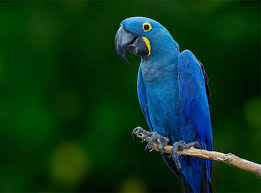
Hyacinth Macaw
Conditions of detention
Hyacinth macaws require a very large cage or aviary that allows for ample movement and flight. The cage should have horizontal bars for climbing, perches, and various toys for enrichment. Due to their size, they need a spacious environment to thrive.
Useful Fact: Hyacinth macaws are strong and need durable toys and cage accessories to withstand their powerful beaks.
Nutrition and diet
A balanced diet for hyacinth macaws includes high-quality pellets, fresh fruits, vegetables, seeds, and nuts. They particularly require a diet high in fats, such as macadamia nuts and Brazil nuts.
Useful Fact: Nuts are a critical part of their diet, providing essential fats and proteins that are crucial for their health.
Health
Hyacinth macaws are generally healthy but can be prone to certain health issues such as respiratory infections, feather plucking, and obesity. Regular veterinary check-ups are important for maintaining their health.
Useful Fact: Monitoring their droppings for changes in color or consistency can provide early signs of health issues.
Grooming and care
Hyacinth macaws enjoy bathing and preening. Providing a shallow dish of water for bathing or misting them lightly with water can help maintain healthy feathers.
Useful Fact: Regular cleaning of their living space is essential to prevent bacterial growth and ensure a healthy environment.
Education and training
Hyacinth macaws are highly intelligent and can be trained to perform tricks, solve puzzles, and mimic sounds. Positive reinforcement techniques work best, and they benefit from mental stimulation and social interaction.
Useful Fact: Consistent training sessions that are short and frequent help reinforce learning and good behavior.
Toys and entertainment
Toys are essential for keeping hyacinth macaws entertained and mentally stimulated. They enjoy a variety of toys, including puzzle toys, foraging toys, and toys that encourage chewing and manipulation.
Useful Fact: Rotate toys regularly to maintain interest and prevent boredom.
Safety
Ensure the living environment is free from hazards such as toxic plants, fumes from non-stick cookware, and small objects that could be ingested. The cage should be secure with appropriate bar spacing to prevent escape.
Useful Fact: Hyacinth macaws are curious and may chew on electrical cords, so keep cords out of reach to prevent accidents.
Accessories
Essential accessories include sturdy perches, food and water dishes, and a variety of toys. Natural wood perches of varying diameters are beneficial for foot health.
Useful Fact: Different types of perches can help prevent foot problems and provide natural exercise.
Socialization
Hyacinth macaws require significant social interaction to thrive. They form strong bonds with their human companions and can become lonely or depressed if left alone for extended periods.
Useful Fact: Spending quality time with your macaw daily, including talking, playing, and training, helps meet their social needs and strengthens your bond.
Travel and Transportation
When traveling, use a secure and well-ventilated travel cage. Acclimate your hyacinth macaw to the travel carrier before trips to reduce stress.
Useful Fact: Cover the travel cage with a light cloth during transport to minimize stress and provide a sense of security.
Behavior and psychology
Hyacinth macaws are intelligent and can exhibit complex behaviors. Understanding their body language and vocalizations is crucial for effective communication and care.
Useful Fact: Hyacinth macaws are known for their gentle and playful nature, and they enjoy interacting with their environment and family members.
Legal aspects
In most areas, there are legal restrictions on keeping hyacinth macaws as pets due to their endangered status. It is crucial to ensure compliance with local and international regulations, including CITES.
Useful Fact: Always check local regulations to ensure compliance with laws regarding pet ownership and breeding.


